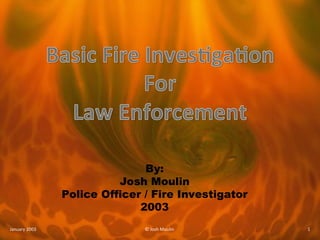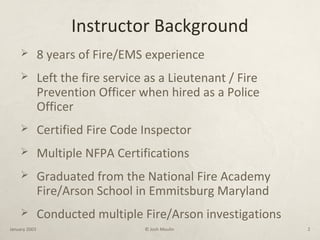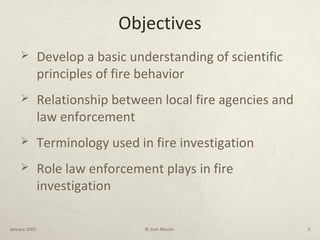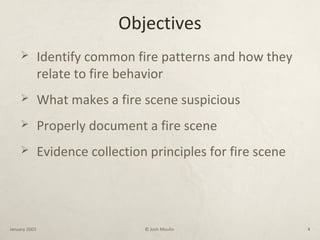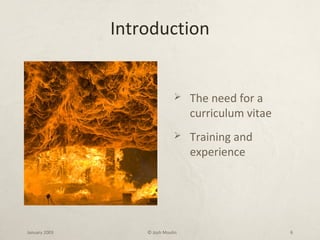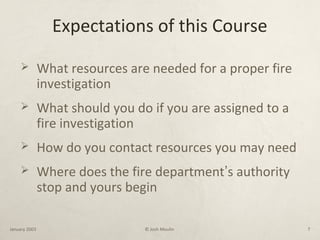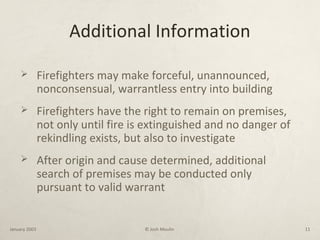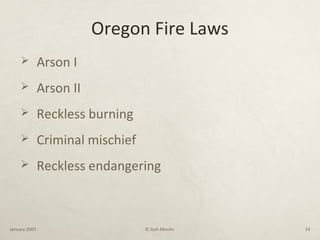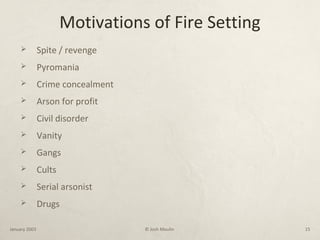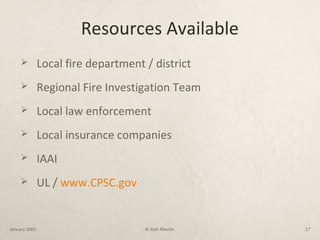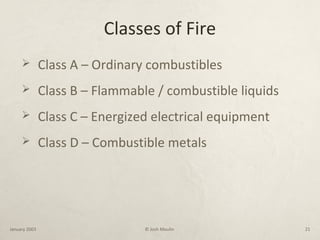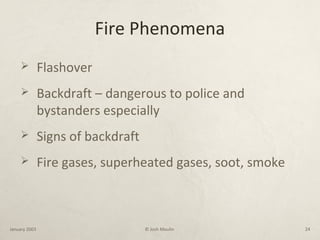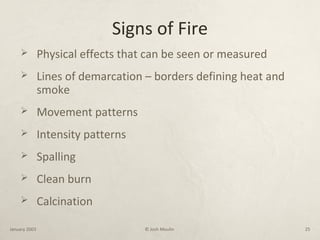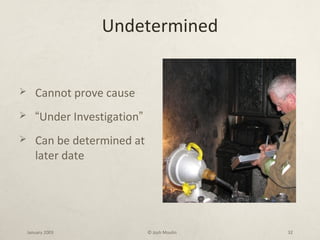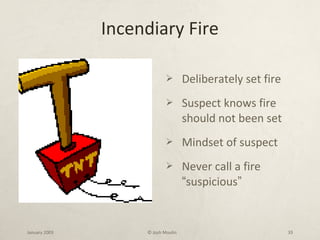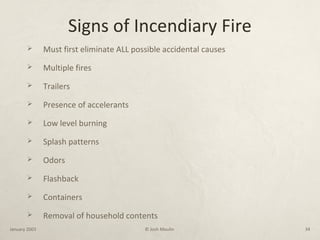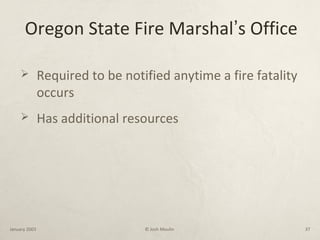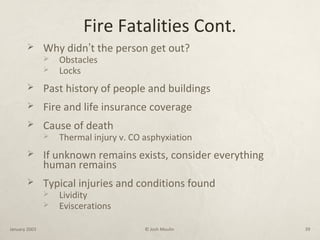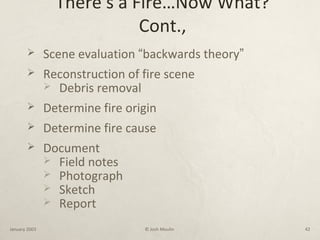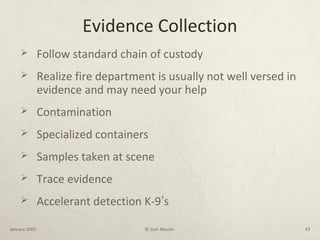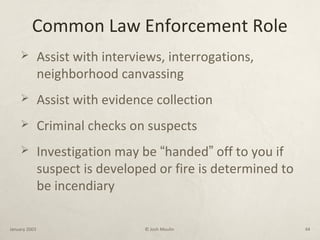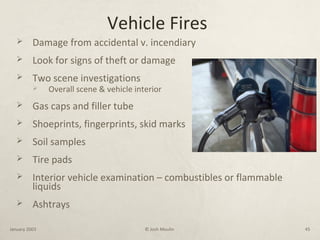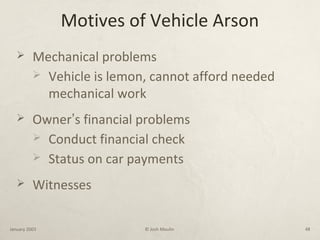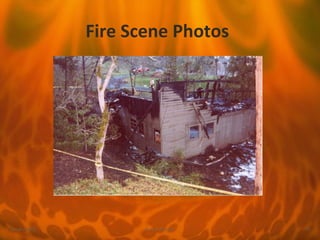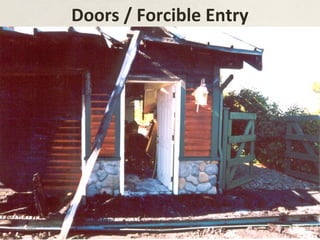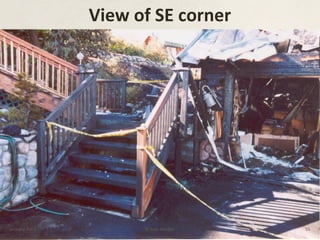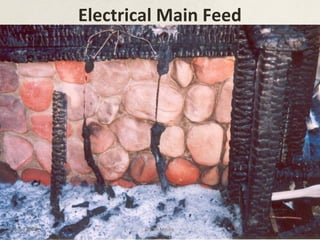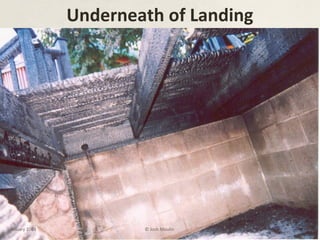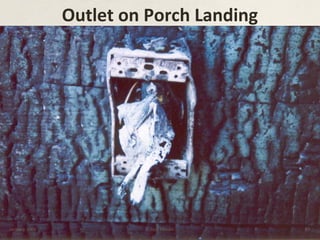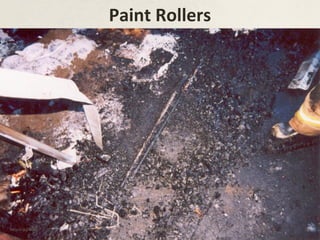Josh Moulin: Basic Fire Investigation for Law Enforcement
- 1. By: Josh Moulin Police Officer / Fire Investigator 2003 January 2003 ? Josh Moulin 1
- 2. Instructor Background ? 8 years of Fire/EMS experience ? Left the fire service as a Lieutenant / Fire Prevention Officer when hired as a Police Officer ? Certified Fire Code Inspector ? Multiple NFPA Certifications ? Graduated from the National Fire Academy Fire/Arson School in Emmitsburg Maryland ? Conducted multiple Fire/Arson investigations January 2003 ? Josh Moulin 2
- 3. Objectives ? Develop a basic understanding of scientific principles of fire behavior ? Relationship between local fire agencies and law enforcement ? Terminology used in fire investigation ? Role law enforcement plays in fire investigation January 2003 ? Josh Moulin 3
- 4. Objectives ? Identify common fire patterns and how they relate to fire behavior ? What makes a fire scene suspicious ? Properly document a fire scene ? Evidence collection principles for fire scene January 2003 ? Josh Moulin 4
- 5. Objectives ? Case law involving the investigation of fire scenes ? Motives of a fire setter ? Courtroom testimony for fire investigation January 2003 ? Josh Moulin 5
- 6. Introduction ? The need for a curriculum vitae ? Training and experience January 2003 ? Josh Moulin 6
- 7. Expectations of this Course ? What resources are needed for a proper fire investigation ? What should you do if you are assigned to a fire investigation ? How do you contact resources you may need ? Where does the fire department¡¯s authority stop and yours begin January 2003 ? Josh Moulin 7
- 8. Legal Aspects of Fire Investigations ? Oregon Revised Statue gives local fire agencies statutory authority to conduct an ¡°origin and cause¡± investigation ? No warrant needed and no consent needed ? Investigation must occur ¡°within a reasonable amount of time¡± ? Fire department must remain on scene January 2003 ? Josh Moulin 8
- 9. Legal Aspects of Fire Investigation ? DA¡¯s office interpretation ? Consent forms ? Civil litigation ? NFPA 921 ¨C Systematic approach to fire Investigation ? Exigent Circumstances January 2003 ? Josh Moulin 9
- 10. Administrative Search Warrants ? Primary objective must be a neutral plan based on specific criteria ? Must show a fire of undetermined origin has occurred on the premises ? Cannot unnecessarily intrude on victim¡¯s privacy ? Evidence found in plain view may be seized in administrative search warrant ? Cannot ¡°roam freely¡± through fire victim¡¯s private residence ? Handout January 2003 ? Josh Moulin 10
- 11. Additional Information ? Firefighters may make forceful, unannounced, nonconsensual, warrantless entry into building ? Firefighters have the right to remain on premises, not only until fire is extinguished and no danger of rekindling exists, but also to investigate ? After origin and cause determined, additional search of premises may be conducted only pursuant to valid warrant January 2003 ? Josh Moulin 11
- 12. Fourth Amendment Applied to Fire Scenes ? Exigent circumstances allow firefighters to enter to fight a fire (Michigan v. Clifford 464 U.S. 287, 294 & Michigan v. Tyler, 436 U.S. 499 ? Post fire searches are admissible when conducted within a reasonable time ? Additional entries, after a reasonable time has passed, must be made pursuant to the warrant procedure January 2003 ? Josh Moulin 12
- 13. Fourth Amendment Applied to Fire Scenes ? Additional investigation after fire is extinguished and firefighters and police have left generally must be made pursuant to a warrant or new exigency. January 2003 ? Josh Moulin 13
- 14. Oregon Fire Laws ? Arson I ? Arson II ? Reckless burning ? Criminal mischief ? Reckless endangering January 2003 ? Josh Moulin 14
- 15. Motivations of Fire Setting ? Spite / revenge ? Pyromania ? Crime concealment ? Arson for profit ? Civil disorder ? Vanity ? Gangs ? Cults ? Serial arsonist ? Drugs January 2003 ? Josh Moulin 15
- 16. Profile of Serial Arsonist ? Single white male ? 20 to 27 years old ? Unstable family environment ? High school educated ? Considered an under-achiever ? Sloppy and unkept appearance ? Poorly adjusted socially and sexually ? If married, usually has periods of separation ? Feels sense of satisfaction after the fire ? If arrested, shows no remorse January 2003 ? Josh Moulin 16
- 17. Resources Available ? Local fire department / district ? Regional Fire Investigation Team ? Local law enforcement ? Local insurance companies ? IAAI ? UL / www.CPSC.gov January 2003 ? Josh Moulin 17
- 18. Basic Fire Behavior ? What is fire? ? Rapid, self-sustained oxidation process with the evolution of heat and light in varying intensities ? Fire must have four things to survive ? Heat ? Oxygen ? Fuel ? Chemical Chain Reaction January 2003 ? Josh Moulin 18
- 19. Fire Components January 2003 ? Josh Moulin 19 Heat Fuel Oxygen Uninhibited Chain Reaction
- 20. Steps of Fire Process ? Input heat ? Fuel ? Oxygen ? Mixing ? Proportioning ? Ignition continuity January 2003 ? Josh Moulin 20
- 21. Classes of Fire ? Class A ¨C Ordinary combustibles ? Class B ¨C Flammable / combustible liquids ? Class C ¨C Energized electrical equipment ? Class D ¨C Combustible metals January 2003 ? Josh Moulin 21
- 22. Stages of Fire ? Incipient stage (growth) ? Free burning stage (development) ? Smoldering (decay) January 2003 ? Josh Moulin 22
- 23. Oxygen Needed for Combustion ? Atmosphere has 20.8 % oxygen content ? Open flaming combustion will stop at 15 ¨C 16 % January 2003 ? Josh Moulin 23
- 24. Fire Phenomena ? Flashover ? Backdraft ¨C dangerous to police and bystanders especially ? Signs of backdraft ? Fire gases, superheated gases, soot, smoke January 2003 ? Josh Moulin 24
- 25. Signs of Fire ? Physical effects that can be seen or measured ? Lines of demarcation ¨C borders defining heat and smoke ? Movement patterns ? Intensity patterns ? Spalling ? Clean burn ? Calcination January 2003 ? Josh Moulin 25
- 26. Char ? Depth of char as indicator ? Consider ventilation ? Shows duration January 2003 ? Josh Moulin 26
- 27. Temperatures ? Aluminum melts at 1220 F ? Copper melts at 1981 F ? Glass melts at 1100 ¨C 2600 F ? Cigarette 550 F at end, 1250 in center ? Collapsed springs at 750 F ? Hardwood ¨C 595-740 F ? Gasoline ¨C 853 F ? Average house fire ¨C 1300 F January 2003 ? Josh Moulin 27
- 28. Fire Patterns ? Fire will usually go up and out ¨C path of least resistance ? Shadowing ? Protection ? ¡°V¡± patterns ? Inverted ¡°V¡± patterns ? ¡°U¡± patterns ? Light bulbs ? Arrow patterns January 2003 ? Josh Moulin 28
- 29. Firefighting Tactics Changing Patterns ? Importance of interviewing Fire Department ? Hose Streams ? Ventilation ? Overhaul January 2003 ? Josh Moulin 29
- 30. Fire Causes January 2003 ? Josh Moulin 30
- 31. Natural Fires Lightning Earthquake Wind No direct human intervention ¡°Acts of God¡± January 2003 ? Josh Moulin 31
- 32. Undetermined ? Cannot prove cause ? ¡°Under Investigation¡± ? Can be determined at later date January 2003 ? Josh Moulin 32
- 33. Incendiary Fire ? Deliberately set fire ? Suspect knows fire should not been set ? Mindset of suspect ? Never call a fire ¡°suspicious¡± January 2003 ? Josh Moulin 33
- 34. Signs of Incendiary Fire ? Must first eliminate ALL possible accidental causes ? Multiple fires ? Trailers ? Presence of accelerants ? Low level burning ? Splash patterns ? Odors ? Flashback ? Containers ? Removal of household contents January 2003 ? Josh Moulin 34
- 35. Signs of Incendiary Fire, Cont. ? Absence of personal papers and items ? Location of the fire ? Evidence of other crimes ? Unnatural fire spread ? Previous fires in same structure or with same people ? Injuries to occupants or others ? Time of day ? Limited / blocked entrance or view January 2003 ? Josh Moulin 35
- 36. Certainty of Opinions ? Conclusive ? All reasonable alternatives to hypothesis are considered and eliminated ? Probable ? More likely than not ? Possible ? Hypothesis can be demonstrated to be feasible but cannot be declared probable ? Suspected ? Hypothesis may be true, but insufficient data to draw a conclusion to the exclusion of other reasonable conclusions January 2003 ? Josh Moulin 36
- 37. Oregon State Fire Marshal¡¯s Office ? Required to be notified anytime a fire fatality occurs ? Has additional resources January 2003 ? Josh Moulin 37
- 38. Fire Fatalities ? Team of fire department, OSFM, local L.E., medical examiner ? Two individual investigations ? Origin and cause ? Death investigation ? Considerations about moving the body ? Additional damage ? OSFM and ME approval ? Photography ? Fire debris around the body January 2003 ? Josh Moulin 38
- 39. Fire Fatalities Cont. ? Why didn¡¯t the person get out? ? Obstacles ? Locks ? Past history of people and buildings ? Fire and life insurance coverage ? Cause of death ? Thermal injury v. CO asphyxiation ? If unknown remains exists, consider everything human remains ? Typical injuries and conditions found ? Lividity ? Eviscerations January 2003 ? Josh Moulin 39
- 40. There¡¯s a Fire¡Now What? ? Evaluate scene for safety ? Secure scene perimeter ? Use ¡°team¡± approach ? Consider respiratory hazards ? Always talk with IC January 2003 ? Josh Moulin 40
- 41. There¡¯s a Fire¡Now What? Cont., ? Solicit information about fire suppression ? Difficulties ? Flashback ? Unusual findings ? Forcible entry ? Time and method of alarm ? Weather conditions ? Color of flames and smoke January 2003 ? Josh Moulin 41
- 42. There¡¯s a Fire¡Now What? Cont., ? Scene evaluation ¡°backwards theory¡± ? Reconstruction of fire scene ? Debris removal ? Determine fire origin ? Determine fire cause ? Document ? Field notes ? Photograph ? Sketch ? Report January 2003 ? Josh Moulin 42
- 43. Evidence Collection ? Follow standard chain of custody ? Realize fire department is usually not well versed in evidence and may need your help ? Contamination ? Specialized containers ? Samples taken at scene ? Trace evidence ? Accelerant detection K-9¡¯s January 2003 ? Josh Moulin 43
- 44. Common Law Enforcement Role ? Assist with interviews, interrogations, neighborhood canvassing ? Assist with evidence collection ? Criminal checks on suspects ? Investigation may be ¡°handed¡± off to you if suspect is developed or fire is determined to be incendiary January 2003 ? Josh Moulin 44
- 45. Vehicle Fires ? Damage from accidental v. incendiary ? Look for signs of theft or damage ? Two scene investigations ? Overall scene & vehicle interior ? Gas caps and filler tube ? Shoeprints, fingerprints, skid marks ? Soil samples ? Tire pads ? Interior vehicle examination ¨C combustibles or flammable liquids ? Ashtrays January 2003 ? Josh Moulin 45
- 46. Vehicle Fires, Cont. ? Window position ? Door positions ? Attempts taken to extinguish ? Presence of personal items ? Engine compartment ? Vin number and license plates ? Fire objectives January 2003 ? Josh Moulin 46
- 47. Vehicle Fire Objectives ? Identify point of origin ? Usually lowest point and greatest damage ? Find the heat source ? Energy which ignited fire ? Determine fuel source ? Material ignited by heat source ? Determine the event of the fire ? How did heat source and fuel combine to start fire ? Determine category of fire ? Must accomplish 1 ¨C 4 first. January 2003 ? Josh Moulin 47
- 48. Motives of Vehicle Arson ? Mechanical problems ? Vehicle is lemon, cannot afford needed mechanical work ? Owner¡¯s financial problems ? Conduct financial check ? Status on car payments ? Witnesses January 2003 ? Josh Moulin 48
- 49. Terrorism Related Fires / Explosions ? ELF / ALF ? Use of common devices ? ATF notification ? Use of tagging ? Websites ¨C Anarchist¡¯s cook book January 2003 ? Josh Moulin 49
- 50. Fire Scene Photos January 2003 ? Josh Moulin 50
- 51. Roof Condition January 2003 ? Josh Moulin 51
- 52. Doors / Forcible Entry January 2003 ? Josh Moulin 52
- 53. Exterior 360 Degree January 2003 ? Josh Moulin 53
- 54. Arial View January 2003 ? Josh Moulin 54
- 55. View of SE corner January 2003 ? Josh Moulin 55
- 56. Interior Garage - Area of Least Damage January 2003 ? Josh Moulin 56
- 57. South Interior Garage January 2003 ? Josh Moulin 57
- 58. Electrical Panel January 2003 ? Josh Moulin 58
- 59. Electrical Main Feed January 2003 ? Josh Moulin 59
- 60. Top of Porch Landing January 2003 ? Josh Moulin 60
- 61. North Side of Landing January 2003 ? Josh Moulin 61
- 62. Underneath of Landing January 2003 ? Josh Moulin 62
- 63. Outlet on Porch Landing January 2003 ? Josh Moulin 63
- 64. Stain Cans January 2003 ? Josh Moulin 64
- 65. Close-up of Stain Cans January 2003 ? Josh Moulin 65
- 66. Paint Rollers January 2003 ? Josh Moulin 66
- 67. Heat Damage January 2003 ? Josh Moulin 67
- 68. Cigarette Butts January 2003 ? Josh Moulin 68
- 69. Heat Damage January 2003 ? Josh Moulin 69
- 70. Heat Damage January 2003 ? Josh Moulin 70
- 71. ¡°V-Pattern¡± January 2003 ? Josh Moulin 71
- 72. Wide View of V-Pattern January 2003 ? Josh Moulin 72
- 73. Fire Damage January 2003 ? Josh Moulin 73
- 74. Fire Patterns January 2003 ? Josh Moulin 74
- 75. January 2003 ? Josh Moulin 75 Questions?

